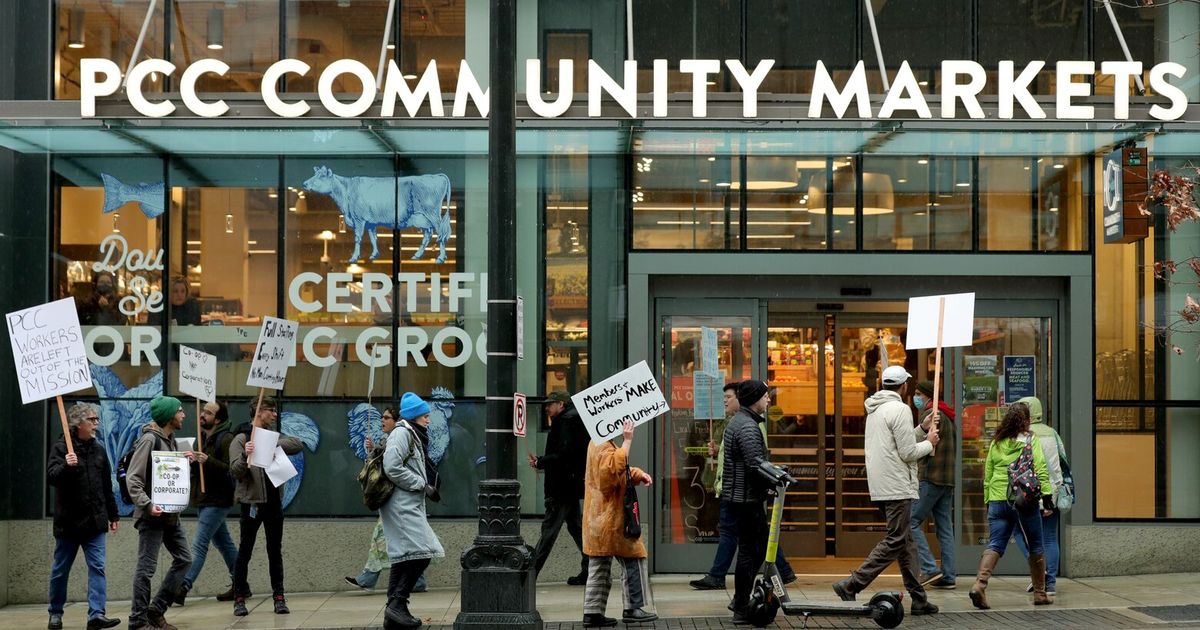Workers at Seattle-based PCC Community Markets ratified a two-year deal Tuesday that brings sizable raises for some, leaves others at just above minimum wage and buys time for the struggling retailer’s turnaround.
The contract caps nearly a year of tension between the natural foods co-op, which has 15 locations in and around Seattle, and its 1,600 workers represented by United Food & Commercial Workers Local 3000. On Jan. 26, UFCW members authorized a strike after rejecting PCC’s latest offer, but reached a tentative agreement just a few days later.
The ratified contract “will make our PCC members the highest paid grocery and meat workers in the area, improve the safety of our stores, and maintain our health care benefits,” said the UFCW in a statement Tuesday night after the votes were counted.
Under the two-year contract, starting wages for most workers at PCC’s Seattle locations will rise to $20.22 in the first year, up from Seattle’s minimum wage of $19.97, said Joe Solorio, a UFCW 3000 grocery retail director. That works out of around $40,000 a year for a full-time employee.
Journey-level wages for grocery workers would jump much more, from $23.10 to $25.15, or around $50,300 annually.
From the start of the bargaining process last spring, the contract was widely seen as make-or-break for PCC, which has struggled in the face of inflation, changing consumer habits due to the pandemic and expenses associated with its rapid expansion. The co-op barely broke even in 2021 and ended 2022 with a loss.
Labor is a major expense at PCC as it is for most businesses. The $114 million PCC paid in wages, benefits and taxes in 2022 accounted for two thirds of that year’s total operating expenses, according to the co-op’s financial reports.
PCC officials emphasized the co-op’s precarious finances throughout the bargaining process. At one point last fall, PCC said wage increases in a UFCW proposal would impose “cash requirements and operating loss [that] would make the co-op’s existence unviable.”
Yet PCC’s hourly workforce has faced a financial crisis of its own, thanks in large part to the soaring cost of living increases in and around Seattle.
Some union members rejected the argument that PCC’s financial woes necessitated major wage concessions.
For many union members, PCC’s financial woes were at least partly self-inflicted by a rapid expansion that left the co-op stuck with expensive store leases, an upscale waterfront headquarters and a large administrative staff with high-salaried executives. Much was made of CEO Krish Srinivasanin’s base salary, which was $500,000, according to PCC’s 2022 annual report.
“Our workers shouldn’t pay the price for some missteps by [PCC’s] front office,” Solorio, the UFCW official, told The Seattle Times in October.
Those sentiments also helped fuel divisions among union members, with some advocating for a more confrontational negotiating strategy that included picketing the now closed downtown Seattle location.
Some workers wanted PCC to effectively make permanent the $4 hazard pay that was mandated during the pandemic by city governments in Seattle, Edmonds and Burien.
Some of that combativeness may have softened as PCC moved to shed some of its costly operations.
In November, the co-op said it would close its downtown Seattle location, which had accounted for about a third of the co-op’s 2022 losses, PCC officials said. The store closed Jan. 19, almost exactly two years after opening.
The co-op also hinted it was considering leaving its downtown headquarters on Elliott Avenue. In October, a PCC spokesperson noted that the lease has nearly expired and that management was “evaluating alternatives that more accurately reflect our co-op’s values and needs.”
Clearly, some of union members’ objections were assuaged by wage increases in the new contract.
Wages for journey-level grocery employees in Seattle stores, for example, would rise to $27.15 by the end of the contract. That’s more than counterparts at other unionized Seattle-area grocery stores, UFCW officials said.
The new contract also shortens the time required to reach journey-level wages, from 10,400 hours, or around five years at full-time, to 6,240, or around three years, UFCW said. It also increases the minimum time between scheduled shifts from 10 hours to 12 hours.
In a statement Wednesday, PCC praised the contract for making its “store staff among the best paid grocery workers in the region” and “reinforces our co-op’s reputation as a great place to work while also securing our long-term financial success,” said PCC spokesperson Kate Hudson.
Still, some of PCC’s union members remained unhappy at the gaps between wages for PCC’s front-line workers and the salaries of its executives.
Also contentious are the contract’s smaller increases for starting workers, whose wages will continue to climb by 25 cents above the expected yearly increases in minimum wage, and lower wages for workers at the seven stores outside of Seattle, where minimum wages are lower.
Such disparities are at odds with PCC’s progressive image.
“There’s definitely a really big disconnect between PCC’s mission and … the reality for staff,” said Sunniva T. Zaratkiewicz, who works in the deli at the PCC in Seattle’s Columbia City neighborhood, and voted against the contract.
Some union members had advocated rejecting the contract. In the end, members “overwhelmingly” approved the contract, said UFCW officials, although they declined to give the exact percentage of the yes vote.
In late January, 87% of the union had voted to authorize a strike, after rejecting PCC’s offer, according to several union members. UFCW officials did not confirm those numbers.
Union officials hope to address members’ lingering concerns in subsequent contracts, both in higher wages and possibly in profit sharing. Although the current contract contains no provision for profit sharing, it does allow union officials to explore such an arrangement with PCC management.
Those explorations could be key to getting PCC back on stable footing, said David Rogers, a retail industry consultant.
Rogers understands PCC’s emphasis on its experienced workers. But he said the co-op also needs to find ways to keep starting workers motivated long enough to reach that journey-level pay while also providing the high-end customer service that distinguishes the PCC brand.
At the end of the day, PCC “has no choice but to compensate its [younger] workers so that they … go that extra mile compared to the employees at Safeway or Fred Meyer,” Rogers said.
#PCC #workers #ratify #contract #coop #track







